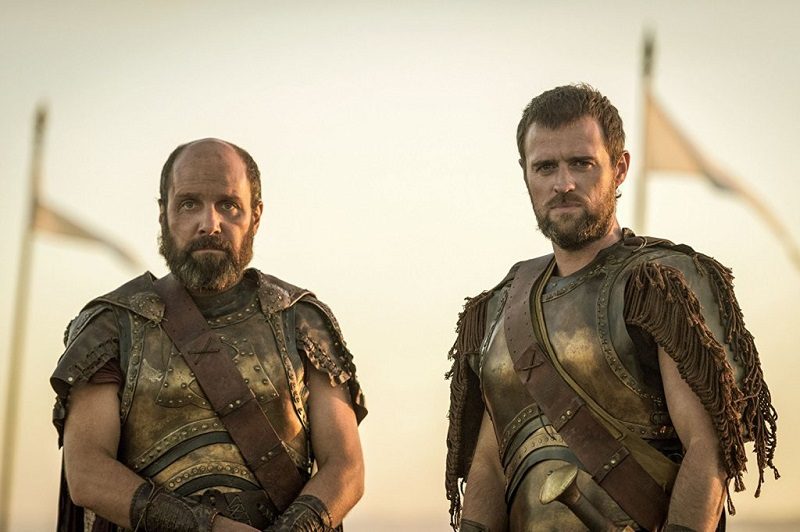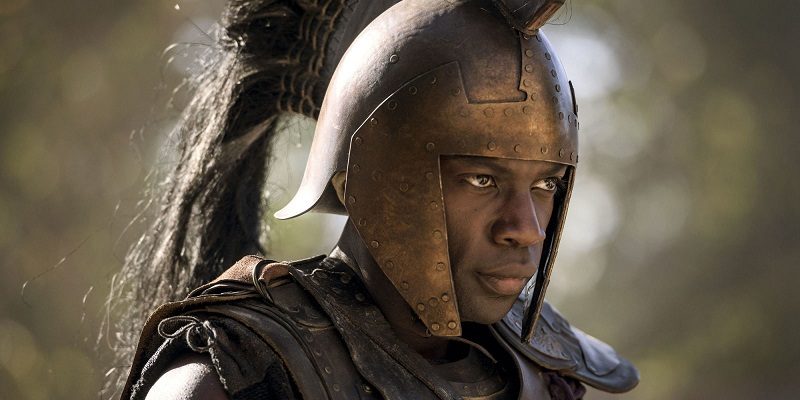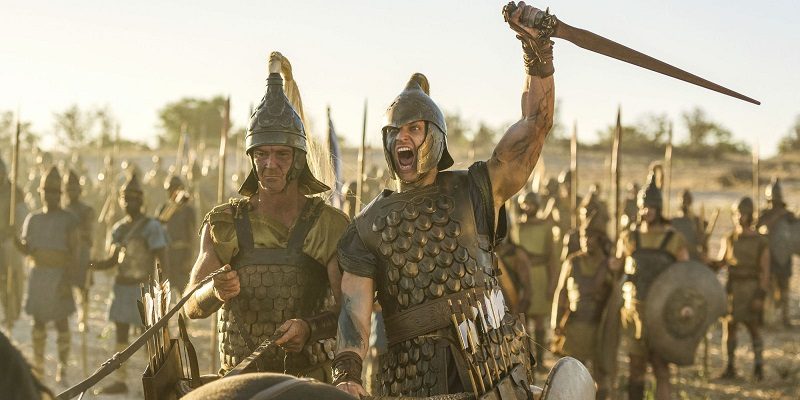Troy: Fall of a City – Conditions Review
"Well, it's an improvement"
"Conditions," the second episode of the BBC/Netflix series
Troy: Fall of a City,
was a huge improvement upon the first episode. But considering the low standards set by "
Black Blood" this was not hard to achieve.
Following the events of "Black Blood," Helen's (Bella Dayne) arrival causes a political and diplomatic crisis for the Trojans. The action has offended King Menelaus of Sparta (Jonas Armstrong) and under the leadership of his brother, King Agamemnon (Johnny Harris), the Greek kingdoms are united. But it comes at a great cost for Agamemnon, and when he lands at Troy his party gives Priam (David Threlfall), King of Troy, a list of unreasonable demands.

"Black Blood" was a dull hour of TV and turned the richness that of Greek mythology into something boring. If that episode just wanted to show Paris and Helen falling in love then the first act of the 2004 film
Troy did a better job. Nor did the episode do an adequate job of establishing the show's characters or the politics of its world.
"Conditions" was at its strongest during its first half, when it focused on the Greek faction, particularly on Agamemnon. Compared to the version of the character played by Brian Cox in
Troy, Harris' version in
Troy: Fall of a City was a more sympathetic figure. The Cox version just used Helen's defection as an excuse to conquer Troy, while here, Agamemnon
was preparing for war out of obligation and duty.

The TV version of Agamemnon is forced to sacrifice his daughter by the goddess Artemis (Thando Hopa) to change the winds and allow the Greeks to sail to Troy. It adds to Agamemnon's motivation to fight the war and why he would expand the war aims. The scene is clearly meant to emulate Stannis Baratheon's sacrificing his daughter, Shireen, in
Game of Thrones to change the weather in the North and allow his forces to march on Winterfell. However, in
Game of Thrones Stannis and Shireen had four seasons of character development which made the sacrifice more emotional whilst in
Troy: Fall of a City they
are only just introduced before the tragic events and we are expected to care about them.
When the negotiations between the Greeks and Trojans breakdown, it leads to hostilities finally flaring up. And the first battle shows the wasted potential of the show. As a battle scene it was incredibly disappointing, considering shows like
Game of Thrones and
Vikings have significantly raised the bar for historical and fantasy battle sequences. While the scope of the battle was lacking, the show did utilize a cool concept: having the gods walking among the soldiers and following their chosen heroes- Achilles, Ajax, and Hector - but rather than make any impact on the scene, all they do is just talk to the camera for a few seconds. This should have been an opportunity to show a different type of warfare on screen, with the gods influencing the battle by protecting their heroes. All that was shown in this episode was a few quick flashes of fighting before cutting to the aftermath where the best moment of action happens- Achilles (David Gyashi) throwing a spear in the back of one unfortunate soldier's head.

Perhaps the show is just saving the bigger battles for later in the series? A better episode arc would have seen the negotiations break down at the end of the episode, thereby allowing episodes three or four to
have a big battle - potentially highlighting the Greeks being better on the open field whilst the Trojans continuing to secure their city, leading to a stalemate.
Troy: Fall of a City is a show that has some interesting interpretations of Greek mythology but it does not have the thrills or the character development to back it up. It is far from being a serious challenger to
Game of Thrones.
Pros
- Some actual drama
- Some interesting concepts and interpretation
- Head impaling
Cons
- A lack of character development or world building
- Budgetary limitations clearly on display
 "Black Blood" was a dull hour of TV and turned the richness that of Greek mythology into something boring. If that episode just wanted to show Paris and Helen falling in love then the first act of the 2004 film Troy did a better job. Nor did the episode do an adequate job of establishing the show's characters or the politics of its world.
"Conditions" was at its strongest during its first half, when it focused on the Greek faction, particularly on Agamemnon. Compared to the version of the character played by Brian Cox in Troy, Harris' version in Troy: Fall of a City was a more sympathetic figure. The Cox version just used Helen's defection as an excuse to conquer Troy, while here, Agamemnon was preparing for war out of obligation and duty.
"Black Blood" was a dull hour of TV and turned the richness that of Greek mythology into something boring. If that episode just wanted to show Paris and Helen falling in love then the first act of the 2004 film Troy did a better job. Nor did the episode do an adequate job of establishing the show's characters or the politics of its world.
"Conditions" was at its strongest during its first half, when it focused on the Greek faction, particularly on Agamemnon. Compared to the version of the character played by Brian Cox in Troy, Harris' version in Troy: Fall of a City was a more sympathetic figure. The Cox version just used Helen's defection as an excuse to conquer Troy, while here, Agamemnon was preparing for war out of obligation and duty.
 The TV version of Agamemnon is forced to sacrifice his daughter by the goddess Artemis (Thando Hopa) to change the winds and allow the Greeks to sail to Troy. It adds to Agamemnon's motivation to fight the war and why he would expand the war aims. The scene is clearly meant to emulate Stannis Baratheon's sacrificing his daughter, Shireen, in Game of Thrones to change the weather in the North and allow his forces to march on Winterfell. However, in Game of Thrones Stannis and Shireen had four seasons of character development which made the sacrifice more emotional whilst in Troy: Fall of a City they are only just introduced before the tragic events and we are expected to care about them.
When the negotiations between the Greeks and Trojans breakdown, it leads to hostilities finally flaring up. And the first battle shows the wasted potential of the show. As a battle scene it was incredibly disappointing, considering shows like Game of Thrones and Vikings have significantly raised the bar for historical and fantasy battle sequences. While the scope of the battle was lacking, the show did utilize a cool concept: having the gods walking among the soldiers and following their chosen heroes- Achilles, Ajax, and Hector - but rather than make any impact on the scene, all they do is just talk to the camera for a few seconds. This should have been an opportunity to show a different type of warfare on screen, with the gods influencing the battle by protecting their heroes. All that was shown in this episode was a few quick flashes of fighting before cutting to the aftermath where the best moment of action happens- Achilles (David Gyashi) throwing a spear in the back of one unfortunate soldier's head.
The TV version of Agamemnon is forced to sacrifice his daughter by the goddess Artemis (Thando Hopa) to change the winds and allow the Greeks to sail to Troy. It adds to Agamemnon's motivation to fight the war and why he would expand the war aims. The scene is clearly meant to emulate Stannis Baratheon's sacrificing his daughter, Shireen, in Game of Thrones to change the weather in the North and allow his forces to march on Winterfell. However, in Game of Thrones Stannis and Shireen had four seasons of character development which made the sacrifice more emotional whilst in Troy: Fall of a City they are only just introduced before the tragic events and we are expected to care about them.
When the negotiations between the Greeks and Trojans breakdown, it leads to hostilities finally flaring up. And the first battle shows the wasted potential of the show. As a battle scene it was incredibly disappointing, considering shows like Game of Thrones and Vikings have significantly raised the bar for historical and fantasy battle sequences. While the scope of the battle was lacking, the show did utilize a cool concept: having the gods walking among the soldiers and following their chosen heroes- Achilles, Ajax, and Hector - but rather than make any impact on the scene, all they do is just talk to the camera for a few seconds. This should have been an opportunity to show a different type of warfare on screen, with the gods influencing the battle by protecting their heroes. All that was shown in this episode was a few quick flashes of fighting before cutting to the aftermath where the best moment of action happens- Achilles (David Gyashi) throwing a spear in the back of one unfortunate soldier's head.
 Perhaps the show is just saving the bigger battles for later in the series? A better episode arc would have seen the negotiations break down at the end of the episode, thereby allowing episodes three or four to have a big battle - potentially highlighting the Greeks being better on the open field whilst the Trojans continuing to secure their city, leading to a stalemate.
Troy: Fall of a City is a show that has some interesting interpretations of Greek mythology but it does not have the thrills or the character development to back it up. It is far from being a serious challenger to Game of Thrones.
Perhaps the show is just saving the bigger battles for later in the series? A better episode arc would have seen the negotiations break down at the end of the episode, thereby allowing episodes three or four to have a big battle - potentially highlighting the Greeks being better on the open field whilst the Trojans continuing to secure their city, leading to a stalemate.
Troy: Fall of a City is a show that has some interesting interpretations of Greek mythology but it does not have the thrills or the character development to back it up. It is far from being a serious challenger to Game of Thrones.